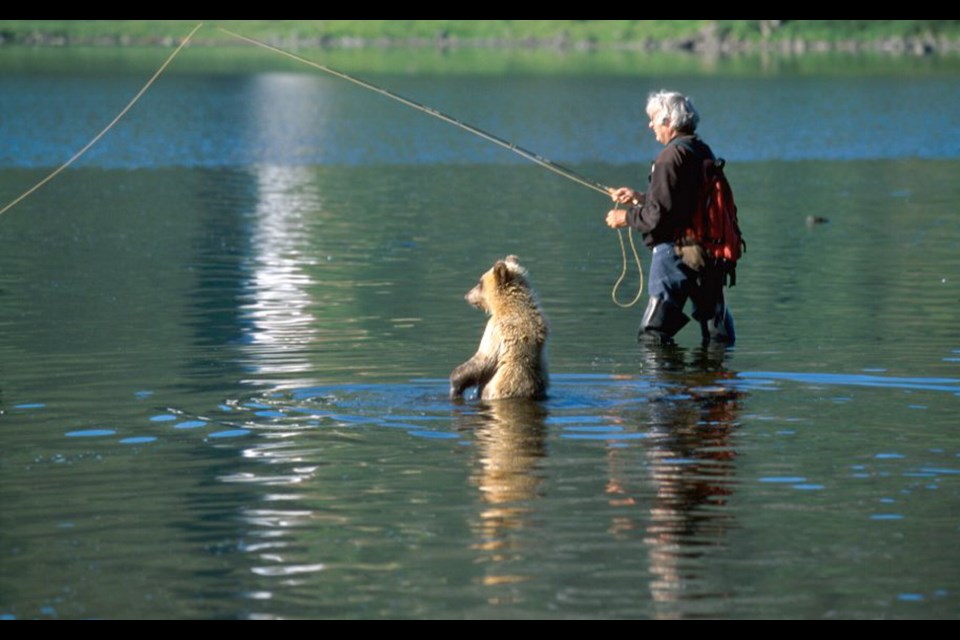Bears that are given no reason to fear humans are willing to be friendly, but the hunting culture in Canada makes them afraid and unpredictable, says a renowned bear expert.
“Bears tend to want to be social with people and share the land with us,” said Charlie Russell, 72, who lived with the brown bears of the Kamchatka peninsula in far east Russia for 10 years.
Russell, an author, photographer and the subject of several documentaries, will talk about his unique journey into the bear world Saturday at 3 p.m. at St. Ann’s Academy Theatre. The talk, which costs $20, is part of the Creatively United for the Planet Festival, which also features wildlife artist Robert Bateman and Faisal Moola of the David Suzuki Foundation.
Russell, who lives in Alberta, speaks Friday in Qualicum Beach as part of a B.C. tour partially aimed at stopping B.C.’s grizzly-bear hunt and having grizzlies listed under the federal Species At Risk Act.
Russell, who has studied bears for 50 years, believes people must change their attitudes to bears.
“People believe [bears] are unpredictable and that, if they ever lose their fear of people, they could be dangerous,” he said.
“My experience told me that bears were extremely intelligent, peace-loving animals who wanted to get along with humans if we would let them, but we were so afraid of them that we could never take them up on that.”
To a bear, a human is a wildly unpredictable animal, Russell said.
“When they meet us, they never know if they are going to get a bullet or a camera or someone running away. They must be completely puzzled.”
In Kamchatka, Russell and his partner, Maureen Enns, were surrounded by brown bears — similar to grizzlies — that had no previous experience with humans.
“I wanted them to learn to trust me,” he said.
He was so successful, he was sometimes left babysitting the cubs.
One day in 2003, however, when he returned to his cabin expecting to find the bears emerging from hibernation, he discovered that all had been killed by poachers.
Now he is continuing his work in Canada. Russell said it’s not simply hunting deaths that are a problem — it’s the stigma promoted by the hunting culture.
"For people to feel good about killing these animals that I find so wonderful, you have to insist they are dangerous and want to hurt us.”
The Suzuki Foundation plans to hand out cards at the event, demanding legal protection for grizzlies. Last month, the group completed a study that found grizzly bears could disappear from many parts of Canada unless they are listed under the federal Species At Risk Act and immediate recovery efforts are started.
“We’re hoping to send thousands of cards to Environment Minister Peter Kent saying that B.C. citizens are tired of waiting for the province to protect the species, and we want to see federal protection under the Species At Risk Act,” Moola said.
B.C. and Alberta are the only provinces without a standalone Endangered Species Act.
It’s estimated there are 15,000 grizzlies in B.C, but nine sub-populations in the south of the province are on the cusp of extinction. In Alberta, about 760 grizzlies remain in fragmented territory.
The Committee on the Status of Endangered Wildlife in Canada has recommended to Kent that grizzlies be listed. Public consultation ends Oct. 3.
In 2001, in the dying days of the last provincial NDP government, a three-year moratorium was put on the grizzly hunt, but the Liberals reversed that decision.
Rob Fleming, NDP environment critic, said in an interview that if the NDP is elected next month, he would want to see increased protection for the bears.
“I think in southern B.C., where there are demonstrably imperiled grizzlies, perhaps there would have to be restrictions or closures,” he said.
In other parts of the province, there needs to be better science and solid information, which means restoring the number of civil servants in areas that have been cut, Fleming said.
Tickets for Russell’s talk are available at Lyle’s Place at 770 Yates St., or online at creativelyunitedfortheplanet.com.



